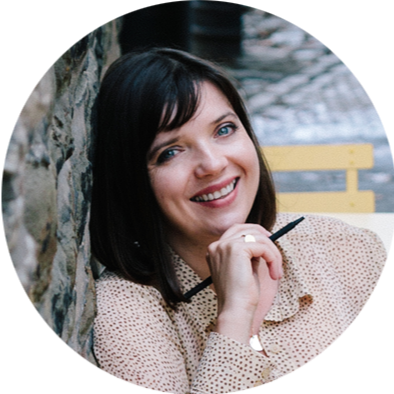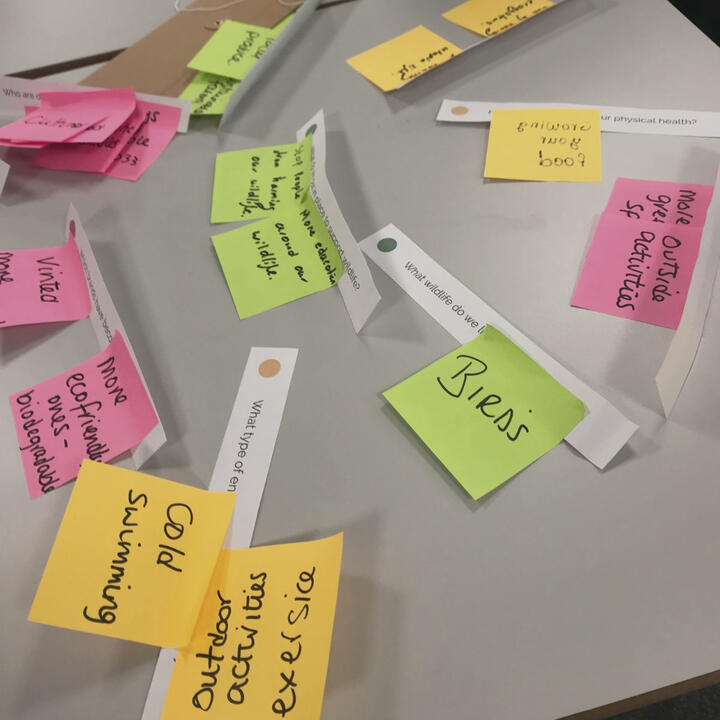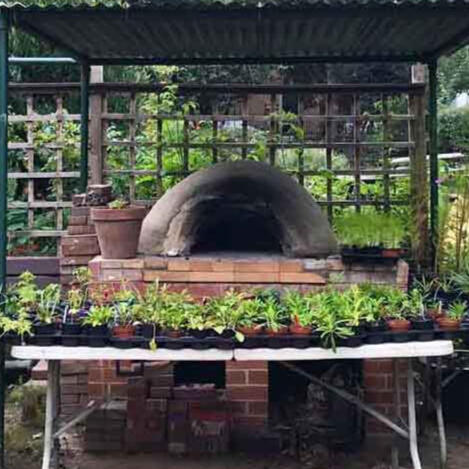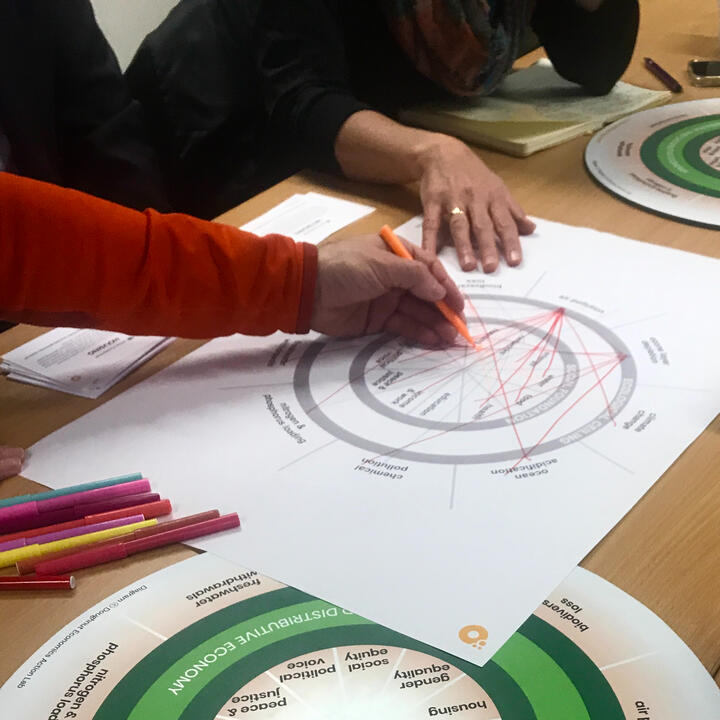
Strengthening connections between knowledge, people, and perspectives to keep complex conversations moving forward.
Throughout my career, I’ve worked on design, enterprise, policy and civil society projects where progress depends on collaboration between ‘un-like minds’. My specialist focus is the early, often-overlooked stage: building understanding of different perspectives before ideas or communication plans are fully formed.Whether it’s climate action, public health, food choices, the future of work, or a similar sustainable futures theme, I help public service professionals explore stakeholder perspectives more deeply, and consider multiple angles for effective engagement.
Background
I bring over 15 years of experience at the intersection of systems thinking, innovation and strategic design to help people explore broader perspectives and build real-world connections between needs and possibilities.
Skilled at navigating vertically (from global governance to grassroots) and horizontally (across sectors and disciplines), my work has consistently focused on alignment - spotting where understanding, values and motivations clash or overlap - and how early trust-building inspires collaborative solutions.I work one-to-one with public service leaders and small teams, and have contributed to initiatives within WHO, Design Council, Doughnut Economics, various universities and local councils. Combining creative and design expertise with an interdisciplinary MSc Sustainable Development in Practice (distinction), my approach blends creative and systems thinking with behavioural and cultural insight to support practical progress on interconnected challenges.
Work with me
Through creative thinking and knowledge-building workshops, short-term project consulting, and dedicated part-time roles, I support senior leaders and teams across public service, academia, enterprise and place-based initiatives to strengthen relationships and strategy for complex stakeholder communication.
Establishing your baseline
In a 1-2 day engagement on a topic of your choice, I teach proven, repeatable methods that help you:
Fully map your stakeholder ecosystem and consider diverse perspectives
Examine a topic for unexpected influences and angles of approach
Identify and mitigate potential misunderstandings or points of friction before they arise
Sketch out narratives and talking points that resonate with different people, values and motivations
Prioritise and plan appropriate methods for engagement that move conversations forward
With a focus on navigating and removing 'unknowns', these skills - and follow-on support where required - will help you avoid hostile reactions, reputational risks and project delays, while accelerating consensus and positive action across complex stakeholder groups.
Recent contributions
Ask me about
Strengthening public-private-civil society collaboration
World Health Organisation • Geneva
Compiled a strategic review using behavioural foresight and design research to enhance cross-sector engagement and collaboration strategies. Curated tools enabling leaders to align stakeholder knowledge, perspectives and resources around the shared goal of reaching 5 million people globally.

Ask me about
Identifying multi-stakeholder narratives for health communication
World Health Organisation • Geneva
Produced novel research exploring country-level and culture-specific motivations to expand anti-tobacco messaging. Introduced actionable tools for policymakers and practitioners to engage local populations globally, supporting WHO FCTC Articles 11 & 12.
Ask me about
Coaching and co-facilitation for a nationwide climate action programme
Design Council • UK
Co-delivered a six-month programme combining workshops, site visits and one-to-one coaching for six UK teams - community groups, social enterprises and local authorities - to strengthen the use of design and systems thinking in local climate solutions.
Ask me about
Aligning Net Zero strategy with reducing urban inequality
Design Council • UK
Supported municipal council departments to connect across disciplines and align Net Zero goals with local needs. Reframed climate strategy around equity, care and social-environmental co-benefits based on proven local needs and perspectives.
Ask me about
Resolving tensions in academic-industry communication
Independent Framework Development
Designed and tested a framework for constructive dialogue between academic advocates and UK finance/technology leaders on a highly contentious topic. Revealed overlapping values and actionable starting points for more effective conversations.
What people say
"Carra brought insight, thoughtfulness, and a deep sense of curiosity to the work we did together at the WHO on tobacco control. She approaches complex challenges with care and intellectual rigor, always seeking to understand the deeper dynamics at play. At the same time, she brings real joy and warmth to a team - Carra made a lasting impact on the work and on me personally."
Dr Hebe Gouda, Technical Officer, World Health Organization
"Carra is a driven, intelligent and curious colleague - when working with us at the Design Council, she helped to deliver a complex project with a range of stakeholders. She pushed participants to think deeper about the work they were aiming to deliver, and ultimately created a more meaningful process. This, in turn, led to longer-lasting outcomes."
Emily Whyman, Senior Programme Manager, Design Council
"I would describe Carra as rigorously creative, in that she combines systems thinking and critical thinking with the spontaneity needed for new ideas. Not many people can do this. She questions everything and because she's also a terrific person, connects with people on many levels. It's an impressive combination of skills for change-making. Working with Carra definitely made me a better designer."
Darren Evans, Founder, Engine Room Design & Design Council Associate
“A special talent for looking at projects delivering solutions that satisfy the requirements from all stakeholder perspectives, are truly relevant and have undeniable integrity.”
William Knight, former Show Director, 100% Design at London Design Festival

Contact
If you’re tackling a complex challenge and conversations feel harder than they should, that’s usually where my work begins.Get in touch to explore how to remove barriers and reveal practical next steps - email me or connect on LinkedIn to arrange a call.
“It was a real pleasure working with Carra, I look forward to working with her again in the future.”
Alternatively, send me a message and I'll get back to you shortly.
Carra is UK-based and works internationally.
© Carra Santos MSc. All rights reserved.
Exploring the Problem
Sharpen strategies by uncovering what really drives behaviour.
Many behaviours that appear irrational or resistant to change are actually shaped by social norms, systems and structures - not people's personal choices. I help teams identify these deeper patterns, so that strategies, policies and services are grounded in the real context of people’s lives.Support includes:
Behavioural insights mapping
Systems thinking for strategy and intervention design
Support for cross-disciplinary collaboration
Helps avoid:
Wasting resources on solutions that people can't adopt
Designing on assumptions and personas that don’t reflect reality.
Overlooking systemic blockers that hinder behavioural change.
Reduces risk by grounding strategy in how behaviour actually works - socially, culturally, and structurally.
If you would like to get clearer on what’s preventing the behaviours you're aiming to encourage, and what might help shift the barriers, email me or connect via Linkedin to arrange a call.
© Carra Santos MSc. All rights reserved.
Exploring Different Perspectives
Develop evidence-based communication that resonates and drives action.
Well-intentioned messages risk falling flat because they miss what really matters to the people they serve. I help teams explore the values, meanings and motivations influencing choices and behaviours, translating these to inform communication strategies that build trust and move people to act.Support includes:
Audience insight and values mapping
Narrative framing and messaging strategy
Values-led storytelling and editorial guidance
Helps avoid:
Messaging that feels generic, patronising or irrelevant.
Misunderstanding what really matters to your audiences.
Undermining trust with communication that misses the mark.
Strengthens impact by speaking directly to people’s values, with nuance, evidence and empathy.
if you're working on communications that need to resonate across diverse audiences, email me or connect via Linkedin to arrange a call.
Carra is UK-based and works internationally.
© Carra Santos MSc. All rights reserved.
Exploring Interconnections
Lay the groundwork for alignment across sectors and perspectives.
Meaningful change rarely happens from within silos. I support mission-driven teams to build alignment across organisations, disciplines and lived experience - clarifying shared goals, uncovering hidden frictions, and creating space for real collaboration.Support includes:
Strategic facilitation and workshop design
Alignment strategy for multi-stakeholder projects
Tools to bridge language, expectations and roles
Helps avoid:
Projects that stall due to hidden misalignment.
'Talking past each other' between sectors, disciplines or motivations.
Missed opportunities for synergy and shared purpose.
Builds cohesion and momentum by addressing tensions early, clarifying roles and creating space for alignment.
if you’re working across sectors and want to build shared understanding, reduce friction, and move forward together with greater momentum, email me or connect via Linkedin to arrange a call.
© Carra Santos MSc. All rights reserved.
About
Carra is an educator and strategist with over 15 years of experience at the intersection of behavioural insight, sustainability and design.
She works with policy professionals, technical experts, educators, and creative teams to develop strategy, learning tools and communication approaches that support meaningful social and behavioural change.Carra's work focuses on shifting unsustainable behaviours and supporting sustainable ones across climate, health, enterprise, and innovation. She has contributed to projects on design-led climate action (Design Council), regenerative and equitable economies (Doughnut Economics), sustainable fashion (Centre for Sustainable Design), global health promotion including tobacco cessation (World Health Organization), and place-based innovation through creative, social and urban design enterprises. For over a decade, she also ran a creativity and innovation studio designing products and environments that encouraged sustainable behaviour and sparked industry-wide innovation.Carra’s interdisciplinary approach blends academic insight with practical tools and culturally responsive communication. She is known for connecting unexpected dots - working across stakeholder groups to uncover shared values, simplify complexity, and move projects forward with coherence and momentum.Her current focus includes futures skills, values-led messaging, and designing learning tools for public sector teams, design schools, community organisations, and creative studios in the UK and Europe.
“Carra’s approach to every project is in-depth, practical and passionate; working with her is always a very pleasurable experience.”
She regularly facilitates workshops, roundtables and participatory research sessions, with engagements and talks including the WHO, Design Council, Design and Technology Association (DATA), Sustainable Innovation Conference, IFI, International Food and Drink Event, and 100% Design London.Carra holds an interdisciplinary MSc (with distinction) in Sustainable Development in Practice from the University of the West of England, and a BA (Hons) in Fashion Promotion & Illustration from the Surrey Institute of Art and Design (now UCA).
Carra is UK-based and works internationally.
© Carra Santos MSc. All rights reserved.
Supporting Services
Team coaching and consulting on live projects, factoring in overlooked perspectives, addressing risks, and course-correcting where required, so that progress is built on stakeholder insights throughout.
Individuals/Teams
→ Thinking, Planning & Capacity-Building
Targeted support to help individuals and teams reflect on current approaches, strengthen their foundations, and make outcomes more achievable and aligned:
Soundboarding & Sensemaking Sessions
One-to-one sessions to review ideas, projects or initiatives that are encountering resistance. We’ll uncover what’s happening beneath the surface, identify the misalignment, and map a more connected way forward.
Workshop Design & Facilitation Tools
Tailored workshops and adaptable toolkits to bridge knowledge gaps, develop shared language, and build capacity for strategic communication - especially across interdisciplinary or cross-sector teams.
Programme/Project-Based
→ Programme/Project Delivery Support
I help teams working on social, environmental and related economic challenges make sense of what’s needed to start positive conversations, and stay grounded in real-world context:
Communication for Social & Behavioural Change
Support to uncover narratives and frames, contextualise data, and design messages that resonate. I work with teams to build communication strategies rooted in behavioural insight, cultural meaning, and what inspires the people they aim to reach.
Cross-Sector Alignment & Collaboration Strategy
Support to align interdepartmental or cross-sector teams around shared goals. I help identify common ground, address conflicting assumptions, and co-create next steps, with lived experience embedded from the start.
Theory into Practice
Research Approach
This human-centred research approach ultimately supports cross-sector communication and collaboration by enabling diverse stakeholders to communicate more effectively, surface and share values, and co-create solutions that are contextually grounded. It also provides a rigorous foundation for responsible innovation, entrepreneurship and intrapreneurship, ensuring that initiatives are informed by proven needs, local insights, social dynamics and shared meaning.The master table below represents my proven flow from theory into practice.Contact me for case studies →
Master Table
1. Guiding Philosophy: Human-Centred Design (HCD)
A problem-solving and innovation approach that puts people's needs, experiences, values and contexts at the heart of the research and design process. It combines empathy, creativity and iteration to develop solutions that are both meaningful to users and viable in the real world.
| 2. Paradigm & Orientation | 3. Theoretical Frameworks/Lenses | 4. Process Frameworks | 5. Primary Research Methods | 6. Data Collection Techniques | 7. Analytic Approaches | 8. Mapping & Framing Tools (Sensemaking) | 9. Outcomes (Research Artefacts) |
|---|---|---|---|---|---|---|---|
| Constructionist & Interpretivist | Value Theory (inc. Values & Frames) | Design Thinking | Grounded Theory | Interviewing | Thematic Analysis | User Journey | Research Plan |
| Social Practice Theory | Systems Thinking | Ethnography | Observation | Discourse Analysis | Stakeholder Mapping | Research Report/Presentation | |
| Systems Thinking (also a process framework) | Futures Thinking | Participatory Research | Journalling | Needs Analysis | Empathy Mapping | Personas | |
| Design Research | Documentary Review | Value Analysis | Knowledge Matrix | Journey Map | |||
| Geospatial Mapping | Asset Mapping | Systems Map | |||||
| Insight Clustering | Narratives/Framing Statements | ||||||
| Needs Hierarchy | Design Briefs/Opportunity Areas | ||||||
| Workshop/Co-Design Sessions & Facilitation Guides | |||||||
| Strategy Recommendations | |||||||
| Guiding Principles | |||||||
| Theory of Change | |||||||
| Mission Map |
Next Steps
Research Planning
Exact combinations of activities and outputs, plus Evaluation methods, prospective Outcomes and Impacts are project-specific. These emerge from preliminary discussion and initial research.Contact me to discuss this approach →
© Carra Santos MSc. All rights reserved.
Case Study
Reframing Smoking Cessation:
From risk to cultural relevance.
Smoking has long been sustained not just by access or addiction, but by meaning. For nearly a century, the tobacco industry has reinforced smoking as a social and cultural practice, using values-based marketing to appeal to deep psychological motivations.This indicates that - while global public health efforts have often focused on the risk-based messaging (e.g. health dangers) that have proven to evoke strong emotional responses - there is potential to explore those social and cultural drivers too.
My Role
As a strategic communication consultant to the WHO, I identified an untapped opportunity to expand the scope of cessation messaging from loss to meaning, using Social Practice Theory and Schwartz Theory of Values as a bridge between scientific facts and and behavioural and cultural insights.Approach
To identify the opportunity, I conducted a cross-analysis of:
WHO pictorial health warnings and their dominant message frames
Values exploited by the tobacco industry over time (e.g. Hedonism, Achievement, Tradition)
Emerging localised cessation campaigns using positive, culturally-tailored narratives
I used Social Practice Theory to evaluate smoking and non-smoking behaviours as cultural practices shaped by knowledge, access, and meaning, then used Schwartz Values to map what meanings are missing from existing cessation messaging.
Research Approach
1. Guiding Philosophy: Human-Centred Design (HCD)
An approach to problem-solving that begins with understanding the people you’re strategising for, and involving them throughout the process to create solutions that are desirable, feasible and viable.
| 2. Epistemology/ Paradigm/ Orientation | 3. Theoretical Frameworks/Lenses | 4. Process Frameworks | 5. Primary Research Methods | 6. Data Collection Techniques | 7. Analytic Approaches (Inductive) | 8. Mapping & Framing Tools (Sensemaking) | 9. Outcomes (Research Artefacts) |
|---|---|---|---|---|---|---|---|
| Constructionist | Schwartz Value Theory | Values-Mapping Framework | Comparative Communication Analysis | Desk Research | Thematic Coding | Schwartz Values Map | Opportunity Report |
| Interpretivist | Social Practice Theory (SPT) | SPT Element-Mapping | Message Audit & Content Coding | Database Analysis | Value Alignment Analysis | Visual Sensemaking Tools | Slide Deck (Internal Use) |
| Pragmatic | Cultural Narrative Scanning | Case Study Synthesis | Gap Analysis | Conceptual Article | |||
| Informal Qualitative Insight | Strategy Recommendations |
Table 1. Research Toolkit. This table encapsulates the overall case. For more details on each stage and specific application, email me.
Insight
96% of health warnings used loss-framed messages focused on Security (e.g. health risks). This analysis revealed an opportunity to strengthen cessation efforts by integrating untapped values like:
Hedonism: Reframing quitting as joyful or freeing
Achievement: Connecting cessation to accomplishment and self-mastery
Tradition/Universalism: Aligning with cultural heritage or care for the living world.
This insight aligns closely with the WHO Framework Convention on Tobacco Control (FCTC) Articles 11 and 12, which emphasise the importance of culturally appropriate, innovative, and positive messaging strategies in tobacco control policy. By integrating values-based communication, this approach therefore supports and extends the policy goals of enhancing public awareness and driving social change across diverse populations.On this basis, I proposed this approach to form the foundation of a scalable, standardised model to craft evidence-informed, culture-specific cessation narratives, while maintaining global cohesion - setting the foundation for future capacity-building and collaboration among public health agencies and communications teams.Impact
This project contributed meaningfully to the WHO’s internal dialogue on values-based messaging, building on existing efforts by uncovering new opportunities to enhance behavioural impact in tobacco cessation communication.This case exemplifies my strength in translating complex academic theories into practical, actionable communication strategies, and my ability to apply connective thinking to bridge social psychology, cultural insights and public health. Ultimately, it reflects my commitment to advancing narrative approaches that contribute to stronger global health outcomes.
© Carra Santos MSc. All rights reserved.
Case Study
The World We Will Create
Inspiring Essex youth to co-create a climate-positive future by 2033.
This case study explores a design-led intervention to support Essex County Council and the Essex Climate Action Commission in engaging young people as co-creators of a student-led Climate Ambassador Network. Within the Design Council’s 'Design, differently' programme, we applied a combination of Design Thinking, Systems Thinking and Futures Thinking to support youth climate engagement action strategy in Essex.The process generated both strategic insights for the Climate Ambassador Network and replicable tools for wider community engagement. This case demonstrates how applied ethnography and design research can yield situated knowledge that is meaningful to both practice and theory.
Context
This project took place within the Design Council’s 2023 ‘Design, differently’ programme, where my colleague Darren Evans and I had been commissioned to introduce design thinking principles (among others) to councils and communities addressing local climate challenges across the UK.Challenge
In this particular project, we were supporting Essex County Council and the Essex Climate Action Commission (the project team) to test and strengthen their approach to developing a student-led Climate Ambassador Network. The project was stalling due to limited success in youth engagement across the region to date.Design Thinking
Design thinking is a process framework closely related to Human-Centred Design, a problem-solving and innovation approach that puts people's needs, experiences, values and contexts at the heart of the research and design process. It combines empathy, creativity and iteration to develop solutions that are both meaningful to users and viable in the real world.I summarise it quite simply: if you are designing something that involves, supports, or affects people, then - naturally - you will have been talking to those people. How else would you know what you need to design?This practical definition which aligns with constructionist and interpretivist epistemologies; that knowledge and meaning are co-produced with participants and shaped by their contexts.Research Approach
There can be a perceived disconnect between academic research and design research. Academic research often focuses on developing general theories and following structured methods, while design research tends to concentrate on iteratively addressing real-world problems in specific contexts. Rather than viewing these approaches as incompatible, I see an opportunity to design research processes that demonstrate both academic rigour and creative engagement from the outset, to keep things moving.This is the approach that Darren and I were positioned to provide, adopting a multi-paradigm approach that draws on:
Human-Centred Design as a guiding philosophy (if designing for people, then designing with those people).
A mix of constructionist, interpretivist and pragmatic perspectives (the understanding that knowledge and meaning are shaped by people’s experiences, values, and the situations they’re in).
A flexible, evolving toolkit of research and design methods.
This combination allowed us to create a research process that was grounded, responsive and rigorous, while also allowing space for creativity, reflection and participation - a hybrid approach that reflects growing trends in transdisciplinary research.
Research Approach
1. Guiding Philosophy: Human-Centred Design (HCD)
An approach to problem-solving that begins with understanding the people you’re strategising for, and involving them throughout the process to create solutions that are desirable, feasible and viable.
| 2. Epistemology/ Paradigm/ Orientation | 3. Theoretical Frameworks/Lenses | 4. Process Frameworks | 5. Primary Research Methods | 6. Data Collection Techniques | 7. Analytic Approaches (Inductive) | 8. Mapping & Framing Tools (Sensemaking) | 9. Outcomes (Research Artefacts) |
|---|---|---|---|---|---|---|---|
| Constructionist | Schwartz Value Theory | Design Thinking | Ethnography | Journalling | Thematic Analysis | Stakeholder Mapping | Research Plan |
| Interpretivist | Social Practice Theory | Systems Thinking | Participatory Research | Value Analysis | Empathy Mapping | Research Report/Presentation | |
| Pragmatic | Systems Thinking | Futures Thinking | Knowledge Matrix | Narratives/Framing Statements | |||
| Insight Clustering | Workshop Facilitation Guide | ||||||
| Strategy Recommendations |
Table 1. Research Toolkit. This table encapsulates the overall case. For more details on each stage and specific application, email me.
Enquiry
Using Design Thinking and Systems Thinking as process frameworks, we supported the project team to explore the broader ecosystem influencing youth engagement in climate action.Stakeholder Mapping is both a system mapping tool and a data elicitation method, consistent with participatory systems thinking. Applying it identified the multiple actors involved - from students, teachers and headteachers to families and community members, spanning homes, schools, sports clubs etc across the county - highlighting the fragmentation of existing efforts, varying levels of climate anxiety among students, and the lack of clear, accessible entry points into cohesive climate action.Empathy Mapping then enabled reflection on the approach to date, with findings revealing that previous engagement efforts had leaned heavily on technical language and environmental data led by the council team, which indicated a critical barrier to effective youth engagement - especially in the context of a cost of living crisis.This revealed a gap between top-down climate initiatives and youth participation - a systems-level engagement challenge where 'meanings' or 'motivations' behind a shared goal are diverse and disconnected. This maps directly to value theory and critical design ethnography, exposing disconnects between institutional framings and lived experience.The project team developed a Knowledge Matrix to clarify knowns and unknowns and draft a Research Plan, with Value Theory and Value Analysis key methods to examine what actually resonated with students: their beliefs, emotions, and lived realities.Research Activities
To address unknowns, a co-creation workshop The World We Will Create was designed and delivered to a test sample of 15–18-year-olds and their teachers, alongside council staff. The workshop - functioning as both data generation and intervention - aimed to offer an interactive demonstration of Participatory Research, and applied a mix of Systems Thinking and Futures Thinking to encourage all participants to look beyond short-term crises toward longer-term collective aspirations.The session began with a visioning exercise based on an excerpt from The Future We Choose by Christiana Figueres and Tom Rivett-Carnac. Next, small groups used structured questions across three domains - Our Living World, Our Cities and Communities, and Our Working Life - exploring the 'meanings' and 'motivations' elements of the individual values and social norms that shape behaviours, as per Values Theory and Social Practice Theory. Participants also used Journalling techniques with creative prompts.Participants then engaged in Insight Clustering to connect ideas across domains, then visually expressed their visions through an exercise based on the Doughnut Economics Dream Spiral - a creative Mapping & Framing Tool rooted in individual values and imagination - culminating in a spiral of illustrated personal visions connected into one collective ethnographic artefact: a Journey Map toward a climate-positive Essex in 2033.Post-Workshop Analysis
Following the workshop, I applied Thematic Analysis to the collected artefacts and interpreted them into a set of ten participatory Narrative/Framing Statements, blending sensemaking and storytelling in a strategic framing format which articulated student hopes through a coherent, motivating lens.OutcomesThe ten emergent themes revealed how students connect direct and indirect climate action to their own lives and futures, revealing both individual motivations and collective visions:
Circular Communities
Developing circular and collaborative skills - like growing, cooking, making, repairing, and more - that bring us together creatively for reduced consumption and 'zero waste'.Restoring Nature
Putting trees, plants, flowers and wildlife ecosystems back in our towns and cities.Tech for Good
Developing technology ethically to empower us, educate us, connect us, and solve problems.Caring Communities
Developing skills and spaces to talk, listen, and spend time with each other, taking care of each other through kind actions, not things we buy.”A healthy utopia life”
Improving health and wellbeing through low-carbon activities like reading, learning, meditation, exercise and positive communication.The New Role Models
Finding more people and businesses with qualities that inspire us, learning from them, and sharing them widely.Clean Energy
Reduce fossil fuel energy use and advocate for energy efficiency, through renewables like solar and heat pumps, insulation, and active travel.Systems Change.
Uniting our voices to improve the justice system, education, equal opportunity, global fairness, funding distribution, and courageous leadership.Future of Work
Creating the conditions for the working practices we want, the jobs we love, and the professions we value, to be accessible, respected and paid fairly.Our Learning Environments
Making operational and behaviour changes in schools and colleges to reduce emissions and preserve resources.
A post-session questionnaire further revealed the five themes most resonant to the group sampled, reinforcing the participatory element of strategy development for Climate Ambassador Network communication.To extend the reach and local relevance beyond the sample, the workshop design was intentionally replicable. The project team was offered Workshop Facilitation Guides, allowing them to encourage their network of teachers to use the same methods to gather and share further data from across the county - a capacity-building outcome which is central to design justice and participatory research ethics.Conclusion
Rather than presenting a fixed solution, this work models a participatory design research process that generates insight with, not for, communities. It bridges institutional policy goals and youth voices using tools and thinking rooted in design ethnography, systems thinking, and values-based futures exploration.Overall, this case study offers a snapshot of how academic and design research might be intentionally aligned from the outset, grounding practical enquiry in robust theoretical frameworks, while retaining the creative and participatory strengths of design.
© Carra Santos MSc. All rights reserved.
Much behaviour change work focuses on individuals. But many of our everyday actions aren’t driven purely by personal values or conscious choices - they’re shaped by the dominant social structures around us. Individual attempts to reduce fast fashion consumption, eat healthier food, increase physical inactivity or quit tobacco, for example, are often blocked by broader social norms and systemic barriers.Drawing on a set of inter-related frameworks, my approach expands the focus from individual to social behaviours by building capacity to explore the cultural, structural and systemic conditions that maintain unsustainable norms, and identify potential interventions to shift them, by:
Across sectors, I strengthen thinking, collaboration and communication so that good ideas can lead to meaningful outcomes. Here’s how clients and colleagues have described the results.
→ Thinking Partner
One-to-one connective thinking calls for leaders and teams
I support leaders and project leads to make sense of complexity - clarifying what matters, what (and who) is missing, and what to do next. These sessions help reconnect vision with momentum and move projects to the next stage.
'Unsticking' a stalled idea, project or initiative
Finding parameters and framing an interdisciplinary challenge in context
Considering communication for cross-sector/disciplinary teams and stakeholders
Related example
The cross-sector WHO Tobacco Cessation Consortium, where I distilled insights from technical meetings into a clearer leadership direction that supports greater collaboration between public, private and civil society partners.
→ Alignment Sessions
Creating space to see things differently and think together
I design and facilitate workshops and learning sessions that help people from diverse sectors or disciplines build collective understanding, align on strategy, and generate next steps on common ground and shared resources.
Strengthening cross-sector innovation processes
Aligning teams around missions and values
Exploring cross-disciplinary insights addressing complex challenges
Related example
Enabling an interdepartmental council team to soften silos and align Net Zero goals with local lived realities - reframing climate action through care, equity, and social-environmental co-benefits to draft a more unified approach.
→ Theory into Practice (and vice versa)
Anchoring grassroots projects in academic theory and global goals
I support academic teams, policy advisors and communities to bridge the gap between theory, policy, and lived experience - grounding real-world initiatives in academic theory and local, national and global governance while uplifting both students and communities.
Integrating local innovation into course/policy content and communication
Designing assignments that reflect real-world complexity
Building collaboration between academic, council and community partners
Related example
Co-designing a futures-led process for Design Council and Essex Climate Action Commission to help young people shape the region’s climate strategy - connecting lived experience with value theory and long-term policy thinking.
→ Sense-Making & Story-Finding
Turning complex data and insights into clarity and inspiration
I analyse research, data, documents and organisational knowledge to surface hidden narratives - patterns, gaps and opportunities - that inform creative communication and engagement, especially in science and health.
Revealing fresh insights and approaches to climate/public health communication
Making research findings more accessible to a wider range of audiences
Identifying gaps in understanding or stakeholder buy-in
Related example
Supporting the WHO through pattern-spotting within behavioural and cultural insights around tobacco communication - shaping strategic next steps through cultural analysis, framing and storytelling.
Project Support
I also help teams apply these skills over the longer term through tailored support:
Soundboarding & Sensemaking. One-to-one sessions to uncover what’s driving resistance or misalignment and to map a clearer, more connected path forward.
Strategic Editorial & Communication Design. Reviewing and shaping content that brings technical insights to life, from framing and storytelling to visuals that make complex ideas clearer and more actionable.
Workshop Design & Facilitation Tools. Custom workshops and toolkits to bridge knowledge gaps, develop shared language, and build strategic capacity - especially across disciplines or sectors.
Approach
I work with policy advisors, technical experts, educators, organisations and entrepreneurs working on strategies, initiatives or projects aimed at building more sustainable ways of working and living.In particular, I help them strengthen two interconnected capabilities that are key to building momentum and avoiding missteps - especially as this work involves engaging with people beyond their traditional frame of reference:
Cross-sector communication and collaboration
Navigating differing language, assumptions and priorities across sectors and communities, so critical perspectives are built into the work from the start.Responsible innovation, entrepreneurship and intrapreneurship
Developing ambitious ideas grounded in real-world needs and shaped through collaboration, not isolation, so changes are more likely to be adopted and viable long-term.
These capabilities are critical because today’s challenges are complex, cross-cutting, and often need more human than technical solutions. They require aligned stakeholders, adaptive mindsets, and the ability to turn learning into action - while engaging the right people, at the right time, in the right way.
| Capability | via Learning Design & Facilitation | via Strategy/Project Support |
|---|---|---|
| Cross-sector communication and collaboration | Learning experiences that acknowledge and navigate differences, develop inclusive research plans, and bring diverse teams together around shared goals. | Leadership coaching and consulting on live projects, helping teams make sense of complex dynamics, build shared understanding, and move forward cohesively. |
| Responsible innovation, entrepreneurship and intrapreneurship | Learning experiences that focus on the early stages of the innovation process - building practical, context-aware foundations for ideas to grow and adapt. | Leadership coaching and consulting on live projects, that helps spot opportunities, surface risks, and course-correct, so that progress connects to anchor points at all stages. |
Contact me to talk about what this might look like for you ↓
Strong FoundationsFrom experience, this work tends to start from two key areas that forge strong foundations for any project or initiative:
Context-Aware Innovation
Developing ambitious ideas grounded in real-world needs and shaped through collaboration, not isolation, so changes are more likely to be adopted and viable long-term.Cross-Sector Communication
Navigating differing language, assumptions and priorities across sectors and communities, so critical perspectives are built into strategic collaborations and communications from the start.
Ask me about

Tobacco Cessation Consortium
World Health Organisation
Supporting Phase 1 strategy development and technical analysis to help WHO strengthen collaboration and sustainable growth across public, private and civil society sectors, in line with WHO FCTC goals.
Ask me about

Education & Enterprise Innovation
Various Clients
Equipping academics and enterprise leaders with futures literacy to drive curriculum change, unravel complex issues and enable alignment with emerging stakeholder expectations and sustainability goals.
Ask me about

The World We Will Create
Essex County • UK
Engaging young people in local climate action using futures thinking and participatory research, co-creating values-led themes that strengthened Essex’s climate strategy with evidence-informed, youth-driven insight.
Ask me about

WHO GTCR
World Health Organisation
Specialist consulting on a 6 month project, translating technical insights into storytelling within the 10th WHO Report on the Global Tobacco Epidemic (WHO GTCR). Enhancing engagement and understanding among global policymakers, funders and community stakeholders.
Ask me about

Design, differently
Design Council • UK
Coach and co-facilitator for a 6 month programme supporting six UK councils and community groups to integrate systems and design thinking methods into climate action plans. Synthesising learning into strategic recommendations for internal policy and national dissemination.
Ask me about

Doughnut Economics
Various Local Councils • UK
Research workshops, analysis, interpretation and strategic recommendations for regional Doughnut Economics economic development strategies, education and communication. Enabling place-based/cross-sector knowledge-sharing and collaboration.
Connective thinking can be defined as making connections between insights or ideas that are not necessarily similar or bound together (Sill, 1996). It's a future-critical skill that helps us reframe stuck challenges, align diverse stakeholders, and move complex projects forward.
Article samples
Smoke Gets In Their Eyes: A brief history of tobacco industry interference in global public health efforts towards smoking prevention and cessation.
Outside the Box: Building strong foundations for social value and wellbeing into property development projects.
Talking on a Loop: Fairphone tackles e-waste with a smartphone we can fix.
Coaching & Consulting for Responsible Innovation
Team coaching and consulting on live projects, factoring in overlooked perspectives, addressing risks, and course-correcting where required, so that progress is built on stakeholder insights throughout.
Learn The Basics
Declutter the Landscape
A practical starting point for enterprise leaders and teams to uncover their starting-point for sustainable futures: cutting through sustainability myths and misunderstandings that can paralyse progress, and equipping you to step forward confidently on what inspires.View PDF Overview Online →

